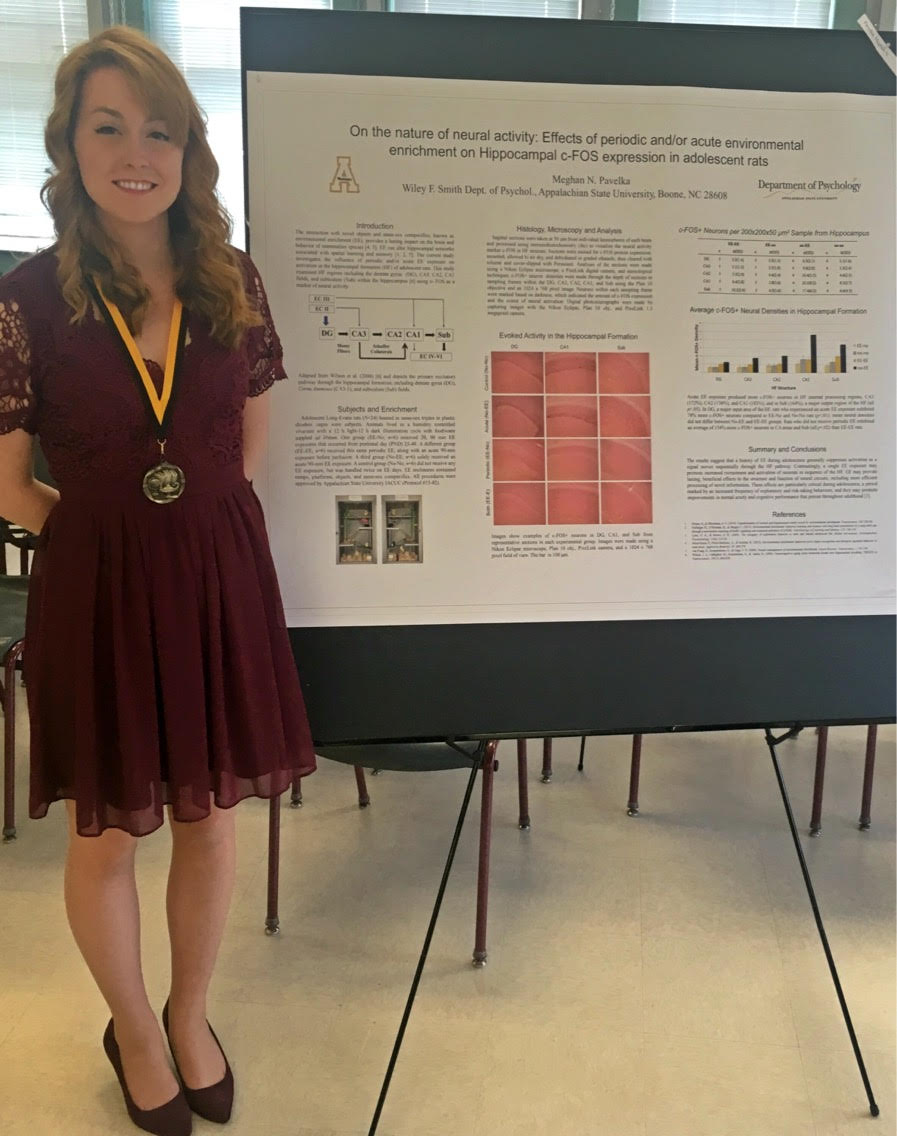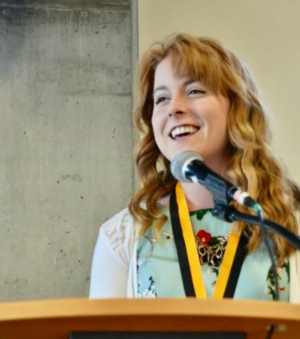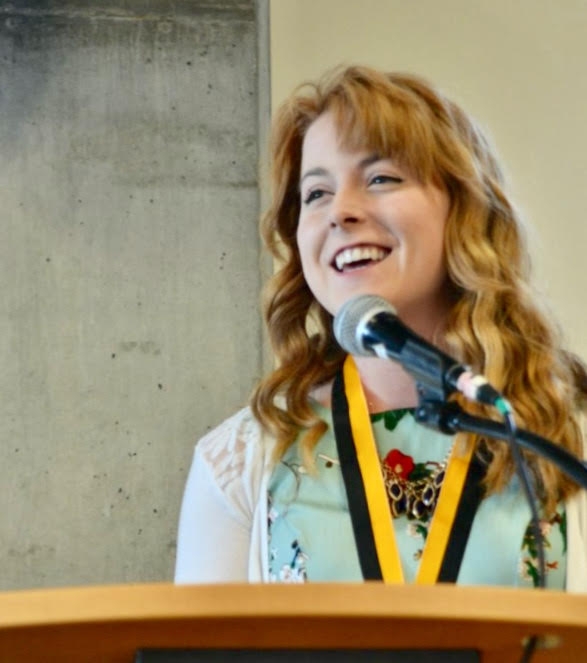Recent Honors graduate Meghan Pavelka (’18) is working in a free clinic in New Bern, North Carolina, in a two-year clinical fellowship program with MedServe. Pavelka is serving in as a Medical Assistant, Medical Scribe, Health Coach, and Quality Improvement Analyst, while also preparing her application to medical school. In partnership with AmeriCorps VISTA, MedServe’s mission is, “Our mission is to immediately improve the health of communities and vitality of primary care practices while exposing tomorrow’s most promising future providers to the great potential for community impact possible through primary care practice in ‘medically underserved’ communities.”
Graduating from Honors at App, Pavelka is a promising future doctor. In both her skillset and professional goals, she fits the mission of MedServe. As she explains,
“My Honors College experience allowed me to develop the necessary grit, organizational skills, and confidence to succeed in my current fellowship position. Through my Honors coursework, I was able to develop a broader understanding of the biopsychosocial factors that affect a patient's health, while expanding upon my abilities to critically assess information and devise novel solutions. I hope that in the next 5-10 years, I'll be utilizing these skills in my pursuit of a medical career, with the goal of eventually starting a free clinic of my own.”
Four aspects of her Honors experience shaped Pavelka most: (1) the study abroad opportunities, (2) working with the Premier Undergraduate Neuroscience Journal IMPULSE, (3) volunteering with the Community Care Clinic, and (4) completing the Honors thesis. Below Pavelka discusses what she gained from each of these experiences. She also offers advice to current Honors students seeking a similar path.

Photo above pictures Pavelka presenting her thesis research at Appalachian State University's Department of Psychology Honors Poster Session held in May 2018. Photo submitted.
Honors requires students to take part in at least one international experience. Pavelka travled abroad twice during her time in Honors at Appalachian. Her sophomore year, she did an Alternative Service Experience (ASE) in the Dominican Republic. There she helped to construct a bathroom in a local schoolhouse of the small community known as El Cidral. This experience shaped her understanding of social justice and global community. Then the summer following her junior year, she did a faculty-led clinical shadowing course in Johannesburg, South Africa. Through this experience, she found mentor in Dr. Chishimba Mowa, professor of physiology and endocrinology in Appalachian's Department of Biology, who led this study abroad course.
“These opportunities allowed me to step outside of my comfort zone and to engage with communities that are very different from my own. I learned to live each day with purpose, to pursue each interaction with empathy, and to serve as a humble and active participant in all aspects of life. My advice to current Honors students would be to seek out study abroad experiences that are challenging, exciting, scary, and different!”
IMPULSE is “the first international, online neuroscience journal for undergraduate publications. Submissions are reviewed by students worldwide under faculty guidance, and articles are immediately published online as they are accepted.” It was founded by Dr. Leslie Sargent Jones who served as the Editorial Team Faculty Advisor during her time as the Director of Honors at Appalachian State University. Currently, Dr. Mark Zrull, Professor of Psychology at Appalachian State University serves as the Editorial Team Faculty Advisor, and Dr. Jones remains the Founding Faculty Advisor Emerita. The editorial board is made up of students from Appalachian State University. Pavelka started working with IMPULSE as a peer reviewer during her sophomore year as a way to pursue her passions of reading, writing, and science. She explains,
“I discovered a love for reviewing neuroscience manuscripts and I joined the editorial board to become more involved with the editing process. In my former capacity as Editor-in-Chief, I had the pleasure of working with IMPULSE's Faculty Advisor to review and edit manuscript resubmissions for journal publication. Some of my additional responsibilities included serving as the primary communication point for journal correspondence, leading editorial board meetings, and organizing outreach activities at both regional and national neuroscience meetings. This experience challenged me to become a more effective leader, writer, editor, and scientist, and it provided me with the necessary organizational and interpersonal skills that serve me in most (if not all) aspects of life. For this reason, I would highly encourage current Honors students to get involved in IMPULSE as well!”
In addition to her work with IMPULSE, while at Appalachian Pavelka also volunteered with the Community Care Clinic of Boone. While in Honors at Appalachian, Pavelka volunteered each week serving as a Medical Intake Specialist and Laboratory Technician. Her volunteer work at the Community Care Clinic included other clinical outreach sites across the community including the Hospitality House, Bradford Park, and Cove Creek School.
“Volunteering at a free clinic allowed me to connect with members of the local and surrounding communities, while I gained valuable clinical exposure to a variety of complex cases,” she said.
The thesis is the culminating experience of Honors education at Appalachian. For her thesis, On the Nature of Neural Activity: Effects of Periodic and/or Acute Exposure to Environmental Enrichment on Hippocampal c-FOS Expression in Adolescent Rats, Pavelka worked with Dr. Mark Zrull as her mentor. She studied the impact of early enriching experiences on the brains of adolescent rats. Her findings supported the notion that consistent physical and social stimulation during adolescence may alter the structure of brain networks in a way that promotes more efficient information processing and greater mental acuity later in life. Pavelka reports,
“I greatly enjoyed writing an Honors thesis and taking Honors courses in subjects that were very different from my major, such as art, public health, and evolutionary sciences. The process of writing a thesis was unlike any endeavor that I had pursued in my previous educational experiences, and it challenged me to expand upon my abilities as a writer and a researcher. Most importantly, I learned how to more effectively manage my time and to stay positive when things don't go as planned.”
We hope the same for all Honors students—that you are broadened by your Honors seminars, enjoy the process of writing your Honors thesis, are challenged, learn and grow, all while staying positive!
Top photo taken at the May 2018 Honors College Graduation Ceremony by Garrett Alexandrea McDowell, Ph.D.
Story by: Garrett Alexandrea McDowell, Ph.D.

